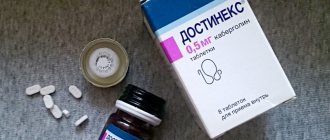Is it possible to use Acyclovir during breastfeeding, indications and contraindications?
The product has a strong antiherpetic effect. Today they treat chickenpox, lichen, and herpes. With Acyclovir and with hepatitis B, inflammatory rashes stop and the possibility of skin scar formation decreases. The use of Acyclovir quickly dries out crusts, relieves pain and itching. The positive value of the drug is its immunostimulating property.
Characteristics of Acyclovir
Medicines against viruses are not antibiotics. It destroys viruses, has medium potency, and speeds up recovery.
It is advisable for nursing mothers to use Acyclovir ointment, because its penetration into breast milk is minimal.
When a doctor prescribes taking a tablet drug, it is strictly forbidden to combine it with alcohol, because alcohol “negates” the effect of Acyclovir.
The drug is effective at the beginning of treatment, in the first days of the disease manifestation. It prevents the spread of infectious lesions of the skin and mucous membranes.
Release forms
The product is available in the form of solutions, ointments for the eyes and skin, creams, powders, and tablets. Eye ointment is prescribed to get rid of stye. It is used no more than 5 times a day.
The duration of therapy involves avoiding wearing contact lenses. Skin ointment for breastfeeding is prescribed to get rid of rashes on the lips. Its components are absorbed into the affected areas treated with ointment and spread throughout the body.
Their traces are found in residual doses in the urine.
The components of the medicine, when taking the tablets orally, pass into breast milk. Because of this, Acyclovir tablets should be taken with a large volume of liquid (at least a glass), and during the day you should drink more herbal tea, fruit drinks, and compotes. The liquid removes the constituent substances of the medicine and clears the mother's milk of them.
Absorption of the active substance occurs in the intestines, where it is concentrated in maximum quantities a couple of hours after taking the drug.
In severe cases of herpes infection, injections are used, the solution is made from powders, or specially produced hermetically sealed ampoules are used. Injections are not used for breastfeeding, since there is a high probability of the drug components penetrating into the blood, and through it into the milk, in high concentrations.
Compound
The product actively resists viral infection at the cellular level by affecting DNA. As a result, viral cells stop reproducing. This happens thanks to the main component of the drug – acyclovir. It is the main substance and gives the medicine its name.
The drug contains:
- calcium stearate;
- medium molecular weight polyvinylpyrrolidone;
- potato starch;
- aerosil.
The components are simple and do not allow one to doubt the chemical nature of the product, which makes their use possible during breastfeeding.
Package
Manufacturers produce the drug in different packaging:
- tablets - in cellular plates of 10 pieces, in one box - 20 tablets;
- ointments are available in 10 g tubes;
- The lyophilisate is packaged in 250 mg bottles.
The packaging of the drug affects its cost. A box with two strips of tablets and ointment cost about 15 rubles. A solution for injection and drip infusion costs more than 260 rubles. This depends on the pharmacy network, where internal markups are made for the delivery of drugs and the earnings of service personnel, which is reflected in their price.
When is it prescribed?
If a woman is on breastfeeding, she is prescribed Acyclovir not only to treat an already outbreak infection, but also to prevent frequently occurring herpes diseases.
The main reasons for prescribing the drug:
- treatment of chickenpox, lichen, keratitis;
- support of the body after transplantation interventions;
- with HIV.
The dosage is selected by the doctor based on the patient’s condition and the form of infection in the body. Standard dosage tablets (200 milligrams) are taken strictly after meals, 2-3 times a day.
When the mother herself gets chickenpox, the medication intake is increased to 4 times a day, in total the daily dose should not exceed 800 milligrams, treatment must be carried out for 5 days, regardless of the disappearance of external manifestations of the rash.
Use during lactation
When herpes rashes affect breast tissue, you must adhere to the following rules:
- the pediatrician will prescribe the medicine most suitable for the infant;
- prevent the child from touching the rashes on the mother’s skin; they are bandaged and covered with medical napkins;
- If there is a rash on both mammary glands, breastfeeding should be temporarily avoided in order to quickly cure the infection.
Breast milk concentrates 1% of the medicine from the dose that a nursing woman drinks. When the medicine is taken internally 5 times, a small percentage of the active substance gets into the milk, and the child gets a negligible amount of the drug.
The medicine is removed from a woman’s body in 3 hours. With such an elimination interval, the use of Acyclovir is very convenient: the mother takes a pill immediately after feeding, drinks a large volume of liquid, and by the next feeding the baby receives pure, high-quality breast milk, without medication residues.
Hygiene measures are important if the mother is treating herpes while feeding the baby, so as not to pass the infection to the child. If this happens, the doctor begins treatment of the baby with the same Acyclovir, calculating the dosage based on the child’s weight.
Precautionary measures
Acyclovir causes side effects, which is why for hepatitis B it is used exclusively on the recommendation of a pediatrician.
Injections are given carefully to persons suffering from neurological dysfunctions and impaired renal function. The drug has a negative effect on the central nervous system, especially when immunity is low and the dosage is exceeded. When applying the ointment, you need to make sure that it does not get on the mucous membranes of the eyes and mouth.
In the accompanying instructions, manufacturers indicate that Acyclovir is not recommended during breastfeeding, but, citing the International Directory of e-lactancia, doctors still prescribe it to nursing women.
Herpes is unpleasant due to its long incubation period, when viruses live in the body, but do not manifest themselves until a certain level of decreased immunity.
The period of pregnancy, childbirth, and the postpartum period are dangerous periods of decreased immunity and increased viral activity.
Here the drug is prescribed and taken only under the supervision of a doctor, who warns about caution when taking the drug and the importance of monitoring your well-being and the condition of the baby.
Side effects
When choosing a remedy to get rid of herpes, the doctor is based on the individual condition of each woman. It will take both external and internal influence on viral agents to quickly deal with them. Acyclovir is a safe and effective medicine suitable for nursing mothers.
The drug will have side effects if the dosage is greatly exceeded, if there is a history of central nervous system diseases or impaired renal function. This medicine is not prescribed to nursing mothers in tablets, injections, or droppers.
The tablets cause:
- allergies;
- nausea, vomiting;
- diarrhea;
- widespread pain throughout the abdomen;
- headaches.
Itching and dry skin with peeling may occur. Upon contact with mucous membranes, inflammation, blepharitis, and keratitis form in the eyes.
Overdose
Taking an extra pill will not bring improvement; rather, it will cause symptoms of overdose, which is expressed in:
- anemia;
- visual impairment;
- swelling;
- muscle pain.
Symptoms of inflammation on the skin intensify, and irritation appears in the eyes.
When taking more than 5 grams of Acyclovir internally, doctors check kidney function and remove excess drug by hemodialysis. When a doctor prescribes a single intravenous injection of 80 milligrams of the drug, this is not considered an overdose.
An excessive dose of the drug causes kidney failure, dehydration, skin rash, and diarrhea.
Drug interactions
The simultaneous use of Acyclovir with other immunostimulants enhances their mutual therapeutic effect. At the same time, simultaneous use of the drug with antibiotics, tetracyclines, and cephalosporins is not recommended. This combination increases the risk of complications in the functions of the urinary organs.
The use of Acyclovir with Probenecid significantly increases the average T1/2 and reduces the clearance of the active component - acyclovir. Combination of administration with drugs of the nephrotoxic group increases the risk of dysfunction of the renal system.
How does breastfeeding affect milk and the baby?
The standard dose of one tablet is 200 milligrams. A simple calculation shows that during mother’s treatment with tablets, no more than 0.3 milligrams of the active substance gets into the milk. This is considered by doctors to be such a small amount that it does not have a negative effect on the baby.
To achieve even less penetration of the active substance into breast milk, the mother needs to increase the volume of liquid she drinks so that the remaining drug is removed from her body in a timely manner.
This time is 3 hours.
Considering that the break between feedings of the child is also 3 hours, and the mother changes the breast given to the baby at each feeding, the correct recommendation from doctors will work perfectly - to drink medicine after feeding.
In addition, during breastfeeding, the mother’s body actively produces antiviral antibodies that neutralize viruses; Antibodies from the mother's milk are transferred to the baby, and the child's immunity is strengthened.
Similar means
Analogues of Acyclovir are:
- Viropex;
- Zovirax;
- Valtrex;
- Lisavir;
- Gerpevir;
- Fenistil;
- Herpferon;
- Cyclovir;
- Vivorax;
- Fukortsin.
Each of the remedies has its positive and negative sides, and their use by nursing mothers should only occur with the approval of a pediatrician.
Release from pharmacies
All drugs against herpes infection are available in pharmacies without prescriptions.
Storage
Storage conditions take into account the ambient temperature and the place where the medicine is stored. Acyclovir should be kept in a dry room where there is no direct light from the sun.
Storing Acyclovir at home:
- unopened ointment – 3 years;
- tablets – 4 years.
It is prohibited to use any form of Acyclovir after the expiration date. Forms that are damaged in the original packaging are not suitable for use.
Doctors' opinion
It is possible to get rid of herpes infection with the use of medication. Doctors recommend Acyclovir tablet form or ointment. The drug is prescribed for hepatitis B only in difficult situations. Sometimes doctors advise not to feed the baby until the mother is completely cured.
Source: https://grudnichky.ru/mamam/atsiklovir-pri-gv.html
Side effect
The frequency categories of adverse reactions listed below are estimates. For most adverse reactions, the necessary data to determine the frequency of occurrence are not available. In addition, the incidence of adverse reactions may vary depending on the indication.
The adverse reactions presented below are listed according to their frequency of occurrence, defined as follows: very common (>1/10), common (>1/100 and <1/10), uncommon (>1/1000 and <1/100 ), rare (>1/10,000 and <1/1000), very rare (<1/10,000).
Frequency of occurrence of adverse reactions
Blood and lymphatic system disorders
Very rare: anemia, leukopenia, thrombocytopenia.
Immune system disorders
Rarely: anaphylaxis.
Nervous system and mental status disorders
Common: headache, dizziness.
Very rare: agitation, confusion, tremor, ataxia, dysarthria, hallucinations, psychotic symptoms, convulsions, drowsiness, encephalopathy, coma.
Typically, these side effects were observed in patients with renal failure or in the presence of other precipitating factors and were mainly reversible (see section "Special instructions"
).
Respiratory, thoracic and mediastinal disorders
Rarely: shortness of breath.
Gastrointestinal disorders
Common: nausea, vomiting, diarrhea, abdominal pain.
Disorders of the liver and biliary tract
Rare: reversible increase in the concentration of bilirubin and liver enzymes in the blood.
Very rare: hepatitis, jaundice.
Skin and subcutaneous tissue disorders
Common: itching, rash, including photosensitivity.
Uncommon: urticaria, rapid diffuse hair loss.
Since rapid diffuse hair loss is observed in various diseases and during therapy with many drugs, its connection with the use of acyclovir has not been established.
Rarely: angioedema.
Very rare: toxic epidermal necrolysis, exudative erythema multiforme.
Renal and urinary tract disorders
Rarely: increased concentrations of urea and creatinine in the blood serum.
Very rare: acute renal failure, renal colic.
Renal colic may be associated with renal failure and crystalluria.
General and administration site disorders
Common: fatigue, fever.
Acyclovir during lactation: is it possible for a nursing mother?
Herpes is a very unpleasant disease that can affect anyone. It is believed that folk remedies cannot cure the problem, you can only suppress the symptoms. To treat herpes, medications are usually prescribed - ointments or tablets. But how does Acyclovir behave during hepatitis B? Is the drug safe for an infant when used by the mother?
Herpes is a very unpleasant disease that can affect anyone.
Characteristics of the drug and indications for use
Acyclovir is a drug used to fight viruses, but is not an antibiotic. Accelerates the recovery of any type of herpes, as well as other diseases such as chickenpox, lichen, HIV infection.
The drug has several forms of release:
- eye ointment - used to treat styes and other diseases, applied to the inside of the eyelid, several times a day, the use of ointment eliminates the need to wear lenses;
- ointment for the treatment of skin diseases and mucous membranes - suitable for combating herpes on the lip or intimate area, as well as lichen. Approved for use during breastfeeding;
- tablets - help to cope with the virus from the inside, particles of the components of the drug can pass into the mother's breast milk, therefore, when taking medication for breastfeeding, it is necessary to consume a large volume of liquid;
- composition for use in the form of an injection solution - injected in severe forms of the disease; the use of the drug is not allowed during breastfeeding.
Side effects and contraindications
Any drug, regardless of what period of life, a woman takes it, has contraindications, Acyclovir is no exception. You cannot use the product if:
- the nursing mother is allergic to the components of the drug;
- kidneys are susceptible to diseases, the use of tablets and intravenous injections is especially prohibited, which leads to kidney failure;
- there is individual intolerance or hypersensitivity to the ingredients of Acyclovir;
- the patient has neurological disorders;
- infected child under two years of age.
In addition to obvious contraindications, the drug has a number of side effects, which include:
- nausea;
- headache;
- convulsions;
- anemia;
- blurred vision;
- conjunctivitis;
- drowsiness and this is only part of them.
Any form of the drug should be used only after consultation with a doctor, analyzing the patient’s existing chronic diseases and the compatibility of Acyclovir with other drugs.
The use of Acyclovir during breastfeeding is permitted in the form of an ointment and with caution in the form of tablets.
Rules for use during lactation
Acyclovir can be used as an ointment during breastfeeding; it is prescribed for the treatment of herpes on the skin, mucous membranes and genitals.
In medical practice, the use of the drug during lactation has been poorly studied, so only ointment is recommended, since acting at the local level, it can be less likely to reach the baby.
Although the action of tablets and injections is intended to be more effective, they should not be used during this important period for a woman. In order to protect the health of the baby, there are some rules:
- treatment should be carried out immediately after the first symptoms are identified;
- the ointment must be used several times a day; one application will not have an effect;
- if herpes is found in the area of contact with the baby - on the chest, then it is better to close this place so that the child cannot touch the affected area;
- only with further development of the disease, when new foci of rash are identified on the body, should you stop feeding and move on to more serious treatment;
- for greater effect, in addition to the ointment, you can dry the blisters using alcohol solutions of calendula or propolis, but the proportions of such products should match those in the pharmacy to prevent even greater skin irritation.
The norm for hepatitis B is the use of ointment up to 5 times a day; at this dosage, a negligible part of the medicinal substances enters the baby’s body.
The components of the drug are eliminated from the female body within 3-4 hours, so the ointment should be used immediately after the next feeding.
Of course, it is very important to ensure that the child does not become infected; for this it is necessary to follow the rules of personal hygiene and not allow the baby to come into contact with the site of the rash.
Overdose
Acyclovir is only partially absorbed from the gastrointestinal tract. As a rule, no toxic effects have been reported with a random single dose of acyclovir up to 20 g. With repeated oral doses over several days of doses exceeding the recommended ones, disturbances from the gastrointestinal tract (nausea, vomiting) and nervous system (headache and confusion) were observed. Sometimes neurological effects such as seizures and coma may occur.
Patients require careful medical monitoring to identify possible symptoms of intoxication. Acyclovir is eliminated from the body by hemodialysis, so hemodialysis can be used to treat overdose.
Acyclovir during breastfeeding: benefit or harm?
A wide variety of viruses attack the human body every day: infections can affect any organs and cause inflammatory or allergic reactions.
People suffering from immunodeficiency are especially susceptible to attack by viruses: the older generation, children of preschool and school age, pregnant and lactating women.
A nursing mother is especially concerned about her well-being, since the baby’s health depends on it. What to do if a woman gets sick with the herpes virus, and the doctor prescribed treatment with Acyclovir during lactation? What kind of drug is this? How safe is it for a child? The answers to these and other questions are presented in the article.
Characteristics of the drug
Acyclovir is a selective antiviral agent.
The active component of the same name suppresses the proliferation of pathogenic viruses that cause herpes, chickenpox, herpes zoster, cytomegalovirus and HIV infection.
Clinical signs of taking the drug are expressed by the localization of a herpetic rash on the skin without further spread, healing of skin rashes at the vesicular stage, and a decrease in pain and itching syndromes.
The medicine also has a preventive effect aimed at treating internal herpes. It is also prescribed as an immuno-strengthening agent. The therapeutic effect of the drug is considered weak, but quite effective.
Dosage forms on pharmacy shelves include ointment, cream, tablets and powder for preparing a solution.
Acyclovir 3% ointment is used to treat keratitis and other eye pathologies caused by the herpes virus. Acyclovir 5% cream is intended to suppress skin diseases caused by these viruses.
Based on the powder form, a solution for intravenous injection is made.
Injections or tablets are prescribed for severe stages of disease, and also as an immunostimulant in cases of reduced functioning of the immune system.
Use of medication during lactation
According to the instructions for use, the drug is contraindicated for women during breastfeeding. This is due to the fact that studies on the effect of the drug on children under one year of age have not yet been conducted. However, the aforementioned Acyclovir for breastfeeding is still prescribed during lactation in any dosage form, with the exception of injections.
The fact is that taking one Acyclovir tablet (the amount of the active substance is 200 mg) creates a concentration in breast milk that does not exceed 0.2 g. This amount is negligible and will not cause any harm if it enters the child’s body. When using an ointment or cream, the concentration is even lower, since the main indicators are concentrated on the mucous membranes and skin.
The medicine does not accumulate in the body and is completely eliminated from it after 2.8-3 hours. An increase in the content of the active component in breast milk is only possible when using large doses. But doctors rarely prescribe such therapy.
In addition, you need to take into account the fact that when taking Acyclovir while breastfeeding, side effects may occur that negatively affect the well-being of the young mother. These include:
- nausea, vomiting;
- painful cramps in the abdominal area;
- intestinal disorders;
- dizziness, sleep disturbances;
- allergic reactions, skin irritations;
- burning in the eye area.
The drug can be used only as prescribed by a doctor and should not exceed the indicated daily dose. Then most side effects can be avoided.
Dosage
Treatment is prescribed by a doctor only after a diagnosis has been made. Women who are breastfeeding should not self-medicate, as there is a risk of infecting the child or harming his health. Standard dosage regimens are as follows:
- Ointment. The use of ointment requires absolute sterility of the hands. A 1 cm long strip of squeezed out product is placed in the lower conjunctival sac. Use interval: 4 hours. The night interval is increased to 8 hours. The procedure is carried out until complete recovery. To consolidate the therapeutic result, it is recommended to apply the ointment for another 3 days.
- Cream. Before using the cream and after, you must wash your hands thoroughly. Do not wash or rub damaged skin areas. The product is applied to problem areas in a thin layer with light patting movements. The medication is taken at least 5 times a day with a course duration of 5 days. To treat an advanced stage infection, the course of therapy is increased to 10 days. The drug has the greatest therapeutic effect when used in the early stages of infection.
- Pills. Acyclovir in tablet form is prescribed to nursing mothers only in severe cases. In order to reduce the concentration of the drug in the tissues of the body throughout the entire treatment course, patients consume an increased amount of water. For the treatment of herpes, the daily dose of the drug is 1000 mg (5 tablets of 200 mg every 4 hours). The course of therapy is 5 days, which can be increased to a maximum of 10 days. As an immunostimulating agent, 400 mg is prescribed 5 times a day. The tablets are taken during or after meals with water. It is better to do this immediately after feeding the baby, then during the next feeding the concentration of Acyclovir in breast milk will be minimal.
During treatment, a breastfeeding mother should follow certain rules.
Firstly, if herpes has formed on the chest, then lactation must be stopped. The virus affects the human body once and for life, manifesting itself in periodic exacerbations. Therefore, it is necessary to prevent possible infection through contact between mother and child during breastfeeding. If one breast is affected, it must be tightly closed.
Milk is expressed from the diseased breast, and the baby is fed from the healthy one. However, if an infection occurs on the chest, the use of ointment is contraindicated, and the attending physician prescribes another, safer medication. The vesicular stage of the disease requires additional treatment with propolis tincture or Fukortsin until dry crusts form.
Secondly, it is important to maintain a proper diet, alternate work and rest, and take walks. This speeds up the healing process and strengthens the immune system.
A young mother should refrain from kissing for a while if herpes has developed on her lips. This will also protect the baby from possible infection. Taking Acyclovir in tablet form prohibits lactation for the period of treatment.
Contraindications
Acyclovir, like any drug, has contraindications. It is not prescribed if the nursing mother suffers from:
- Allergic reactions that may be caused by the medication.
- Kidney diseases, especially for tablet and intravenous forms of the drug.
- Neurological disorders.
- Individual intolerance to the components of the medication.
The drug is prohibited for the treatment of children under 2 years of age.
Most doctors believe that Acyclovir can be used to treat viral infections during breastfeeding. The main thing is to strictly follow the doctor’s instructions and not change anything in the course of the prescribed treatment. A nursing woman needs to carefully observe the rules of personal hygiene and safety measures so as not to infect her baby.
In general, Acyclovir is an effective antiviral medication that speeds up recovery and strengthens the immune system.
Mothers' opinions on the use of the drug
Reviews from mothers about taking Acyclovir while breastfeeding:
I am a pathological carrier of the herpes virus. At least once every six months I get a rash on my lips and the skin under my nose. This is what happened to me during lactation, when I was feeding my three-month-old son.
Before giving birth, I used Acyclovir ointment, which always helped me a lot. And here I’m confused: won’t it be harmful to the child? I went to the doctor.
The doctor allowed me to use Acyclovir according to the instructions, both ointment and tablets to activate the immune system. Everything went by very quickly.
Pros: good drug, helps quickly.
Cons: Acyclovir tablets during lactation are still alarming.
Anastasia, 22 years old
It so happened that I first got herpes when I was breastfeeding my five-month-old baby. First, a small pink spot appeared in the corner of the lips, which was very itchy. A couple of days later it was already a large yellowish sore, which still itched and hurt.
It was difficult to open my mouth. Mom said it was herpes and advised me to buy Acyclovir.
I decided to first consult a doctor, maybe this product cannot be used during lactation? Or are there other medicines for this case? The doctor prescribed me therapy with Acyclovir, saying that there is simply no better remedy in the fight against herpes.
It does not pose any danger to the baby, since it practically does not pass into breast milk. The only thing is that you should not kiss the child until the illness passes and wash your hands with soap more often. I used the ointment for 5 days according to the instructions. Everything has healed without a trace.
Pros: effective, safe and inexpensive drug.
Cons: none.
Elvira, 35 years old
I got sick with herpetic keratitis. It was very unpleasant, and then there was my six-month-old toddler in my arms, whom I was breastfeeding.
I was very afraid of infecting him, because I knew that herpes is an infection that can be suppressed, but cannot be completely cured. I went to the hospital.
I was prescribed Acyclovir cream and a course of similar pills to stimulate the immune system. I was treated, everything went away. The child has not become infected, and so far I have not seen any alarming manifestations.
Pros: helps efficiently, quickly. Affordable price.
Cons: When applied, a slight burning sensation is felt in the corners of the eyes.
Anna, 36 years old
Acyclovir is a truly high-quality medical drug that is widely used in the treatment of herpes and other viral infections. It is safe to take during lactation, provided that all doctor's recommendations and personal hygiene rules are followed.
We recommend other articles on the topic
Source: https://herpes.guru/lekarstva/aciklovir-pri-grudnom-vskarmlivanii.html
Release form and composition
Dosage form – tablets: flat-cylindrical; dosage 200 mg – white, with a notch and a bevel; dosage 400 mg – round, white or almost white, with a double-sided chamfer and a notch on one side (in 10 pcs. in cellular contour packs made of polyvinyl chloride film and aluminum foil, in a cardboard pack along with instructions for medical use of the drug, 2 packs; in cans made of low-density polyethylene, 20 pcs., in a cardboard pack 1 jar and instructions for use of Acyclovir Avexim).
Composition of 1 tablet 200 mg:
- active ingredient: acyclovir (in terms of anhydrous substance) – 200 mg;
- additional substances: milk sugar (lactose monohydrate) – 119.4 mg; sugar (sucrose) – 13.2 mg; Magnesium stearate – 3.4 mg; potato starch – 66.2 mg; povidone K17 (low molecular weight medical polyvinylpyrrolidone) – 5.6 mg; sodium lauryl sulfate – 1.6 mg; stearic acid – 0.6 mg.
Composition of 1 tablet 400 mg:
- active ingredient: acyclovir (in terms of anhydrous substance) – 400 mg;
- additional substances: MCC (microcrystalline cellulose) – 43.12 mg; sodium carboxymethyl starch – 25 mg; povidone K25 – 7.88 mg; Magnesium stearate – 4 mg.
Acyclovir during breastfeeding: ointment and tablets
11.02.2020 | 842
Herpes is the most common viral disease, affecting 90% of people. In the absence of stress on the body, the immune system produces antibodies and fights viruses.
If the immune system is damaged, then the appearance of a cold on the lips is inevitable. To treat colds, pharmacies sell many ointments and tablets, often these are broad-spectrum antibiotics, which are contraindicated during lactation.
But for nursing mothers there is a medicine prescribed by doctors.
Breastfeeding mothers are at risk. Even if a woman did not know what herpes was before giving birth, after childbirth more than 95% of new mothers encounter it.
Self-medicating at home is very dangerous during lactation, therefore, when going to the doctor and getting a prescription in hand, the question often arises: “Is it possible to use Acyclovir while breastfeeding? How will the baby react to it, and will breast milk change from taking the medication?”
Release form of the drug
Acyclovir is an antiviral drug that slows down and suppresses the development of the herpes virus in the body. The medicine is not an antibiotic and has 4 release forms (Table 1).
Table 1 – Forms of release of the drug Acyclovir
| Eye ointment | External cream | Pills | Solution for parenteral administration |
| It is used for inflammation of the hair follicle and interciliary space to treat eye diseases and inflammation of the cornea. Helps remove the herpes virus on the lip and intimate area | Used to treat rashes of various etiologies on the skin, lips, and genitals | Dispensed with a doctor's prescription. They act not locally, but throughout the body | Available in powder form. Used for severe viral infection. Most often used for HIV-positive diagnosis |
Acyclovir fights not only against herpetic rashes, it is also used for chickenpox, lichen, herpes zoster, and the Epstein-Barr virus.
Can Acyclovir be used while breastfeeding?
Expectant mothers and women during lactation are allowed to use external Acyclovir ointments on the recommendation of a doctor, but during the period of treatment it is necessary to stop breastfeeding [1].
An ointment that is spread on the skin or mucous membrane does not pose a great danger, since the absorption of the drug into the blood occurs in a minimal dose [2].
Restrictions during lactation
Tablets and injections are strictly prohibited - this is explained by the amount of active substance in one therapeutic dose of the drug. When using parenteral administration of the drug, its concentration in the blood will be enormous, and this entire dose will enter the baby’s body. [3]
The effect of the drug on a child has not been fully studied, so doctors protect children from possible consequences and do not prescribe the administration of drugs using an invasive method.
Features of using ointment during breastfeeding
The effectiveness of the drug has been proven over years of using tablets and ointments against the herpes virus.
For a mother who is breastfeeding, there is no fear that by smearing her lips, she, along with the milk, will transfer enzymes to the baby that help block the virus.
The absorption of medications into the blood through the skin is insignificant, and the dosage of the active substance in the blood will be half that allowed for children under one year of age.
Is it possible to breastfeed if you have herpes?
You should not stop breastfeeding while the wound from herpes is healing or during treatment with ointment. The child must receive antibodies from the mother that fight the virus. Feeding during such illnesses only strengthens the baby.
Important : the only exception is herpes on the nipples or areolas (skin around the nipple). If a rash appears on one breast, you can give the baby the other, and only express milk from the infected one. An important point in this case is to prevent the child from touching the rash with his hands, much less his lips. [5]
Prevention of herpes in a child
It has been scientifically proven that a mother who feeds her baby during a cold passes on antibodies to him along with breast milk. You just have to be careful when communicating with your baby:
- It is better to wear a protective mask, since the herpes virus is transmitted not only by contact, but also by airborne droplets;
- If you have a rash on your lips, you should not kiss your child.
special instructions
As a result of clinical studies, there was not enough data to conclude that the use of acyclovir helps reduce the risk of chickenpox in immunocompetent (without clinical and laboratory signs of AIDS of any etiology) patients.
When taking Acyclovir Avexim in combination with other nephrotoxic drugs, the risk of developing renal failure increases.
Repeated or long-term courses of treatment with acyclovir in patients with severe immunodeficiency may contribute to the emergence of resistant (having reduced sensitivity to acyclovir) strains, and therefore further therapy with the drug may be ineffective.
Patients prescribed high doses of oral acyclovir should ensure that they receive sufficient fluids.
Since acyclovir is excreted by the kidneys, it is necessary to adjust the dose of the drug in patients with impaired renal function.
Elderly patients, who may experience impaired renal function with age, need to adjust the dose of Acyclovir Avexim.
Both patients with impaired renal function and elderly patients are at increased risk of developing side effects from the central nervous system (most of these reactions are reversible and disappear after discontinuation of the drug), and therefore they should be provided with close medical supervision .
All patients, especially those with clinical signs, should exercise caution to avoid potential transmission of the virus. In addition, it is important to inform all patients about cases of asymptomatic virus carriage.
Impact on the ability to drive vehicles and complex mechanisms
There have been no adequate studies on the effect of Acyclovir Avexim on a person’s ability to drive vehicles and operate complex machinery. Based on the pharmacological properties of the active substance, it is impossible to predict any negative impact of acyclovir on these activities, however, the profile of side effects that occurs with its use should be taken into account. For example, it must be taken into account that dizziness may occur when taking acyclovir, and therefore persons employed in potentially hazardous industries or driving a car should be careful.
Drug interactions
No clinically significant interactions were observed with the use of acyclovir.
Acyclovir is excreted from the body unchanged in the urine through active tubular secretion. All drugs that have a similar route of elimination can increase its concentration in plasma.
Cimetidine and probenecid reduce the renal clearance of acyclovir and increase its AUC.
An increase in plasma AUC was also observed with the combined use of acyclovir and the inactive metabolite mycophenolate mofetil (an immunosuppressant used in transplantation). However, due to the broad therapeutic index of acyclovir, no dose adjustment is required in this case.
The AUC of theophylline increases by an average of 50% when taken simultaneously with acyclovir. For this reason, it is necessary to measure plasma theophylline concentrations when taking two drugs in combination.
Reviews of Acyclovir Avexima
On the Internet you can find mostly positive reviews about Acyclovir Avexima. Among the advantages of the drug are its effectiveness, rapid action and affordable cost. Patients also note that the drug is well tolerated and that taking tablets enhances the effect of using a similar ointment. Most people consider Acyclovir Avexima to be the best treatment for herpes, which has no competitors in this price category.
Some users do not like the frequency of use of tablets; they consider frequent use to be the only drawback of the drug.











